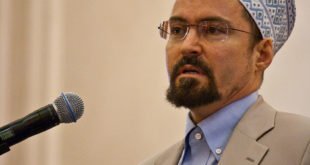The recent profusion of graphic televised footage of dead bodies, sometimes charred or disfigured, has raised difficult ethical and journalistic decisions for news editors, whether at CNN or the Hizbullah-backed Lebanese channel Al-Manar. In a series of interviews, news editors talk about their decision-making policies on screening disturbing images. The …
Read More »The Best Hope for Democracy in the Arab World: a Crooning TV “Idol”?
It is a perfect summer evening in Damascus; a cool wind sweeps in from the desert, soothing scorched pavements and carrying the smells of strong coffee and cured meat from roadside stalls up into the clotheslines and concrete hulks of the Syrian skyline. Normally the city's streets would be packed …
Read More »The Dark Desert Night is Alight: The Impact of War Visuals on Television Viewers and Print
This paper was presented at the Broadcast Education Association's annual convention in April 2004, where the author participated in a panel organized by the association's International Division. The dark desert night is alight with streaks of blue and red streaming across the sky. A mosque is the symbol-laden backdrop for …
Read More »The Proposed Satellite Television Channel of the Organization of the Islamic Conference: A Response to Moral Panic?
I. INTRODUCTION The Organization of the Islamic Conference (OIC) held its ninth conference in Doha, the Qatari capital, during November 2001. Members decided to establish an Islamic English-language satellite television channel. The main aim of such an initiative is apparently to educate the West about "real Islam," in light of …
Read More »Not Every Picture Tells a Story: A Death in Falluja
This article first appeared in The New York Times. All of life seems to be about denial--the denial of death, the denial of reality, the denial of everything that is convenient for us to deny. Photography, because of its causal relationship to the world, seems to give us the truth or …
Read More »On a Journey with Hamza Yusuf
Hamza Yusuf Hanson was born in Walla Walla, Washington, and raised in northern California. He became Muslim in 1977 in Santa Barbara, California and subsequently moved to the Middle East and studied Arabic and Islam for four years in the United Arab Emirates and later in Medina, Algeria, Morocco, and …
Read More »Amr Khaled: Broadcasting the Nahda
In the aftermath of the attacks of September 11, 2001, renewed fears about the threat of "Islamic Fundamentalism" conjured images of bearded and turbaned zealots spoiling for holy war against the West. More than three years later, such stereotypes seem confirmed in the grim reality of the morning's headlines, as …
Read More »US International Broadcasting Strategies in the Arab World: An analysis of the Broadcasting Board of Governors’ strategy from a public communication standpoint
The US government has devised a plan to repair its image in the Arab World. This plan includes generously-funded, government-sponsored international broadcasting, known in the past as Voice of America or Radio Free Europe. Today, under the guidance of the Broadcasting Board of Governors (BBG), two new programs have been …
Read More »NourSat, the New Satellite in the East
There's a new satellite beaming towards the Middle East: "NourSat" (meaning "Light" Sat) is part-owned (30 percent) by the giant Mawared Group, the same company that has financed Orbit this past 10 years. NourSat is the name given to a handful of beams on a new Intelsat satellite operating …
Read More »Balancing Act: UAE Satellite TV Channels Between National and Pan-Arab Markets
With a GDP of $81 billion in 2003, up 4.5 percent from the previous year, and an 8.7 percent population growth rate that brought the population to more than four million in 2003, the United Arab Emirates (UAE) have all the economic and business ingredients for the most dynamic Arab …
Read More » Arab Media & Society The Arab Media Hub
Arab Media & Society The Arab Media Hub

